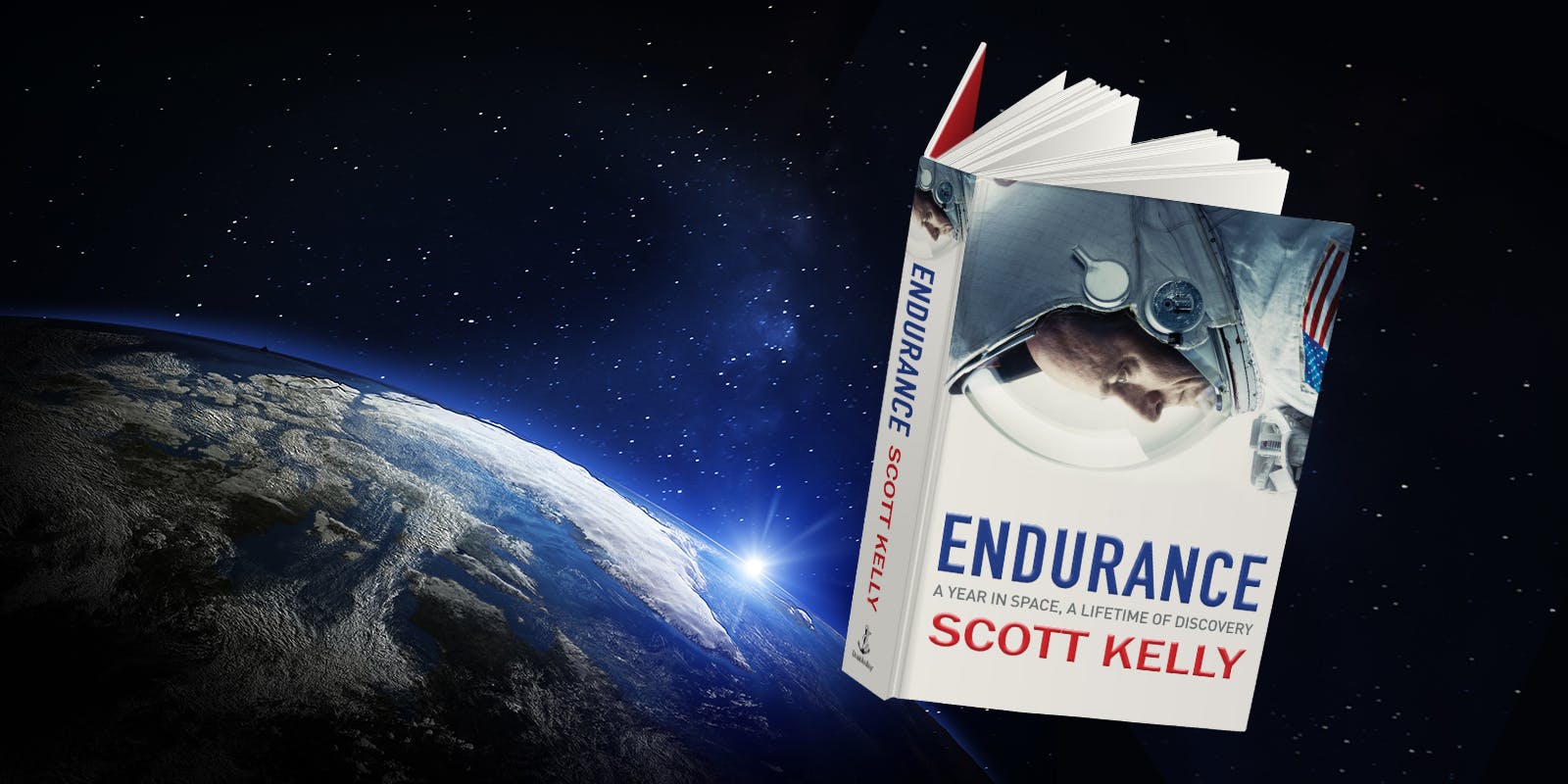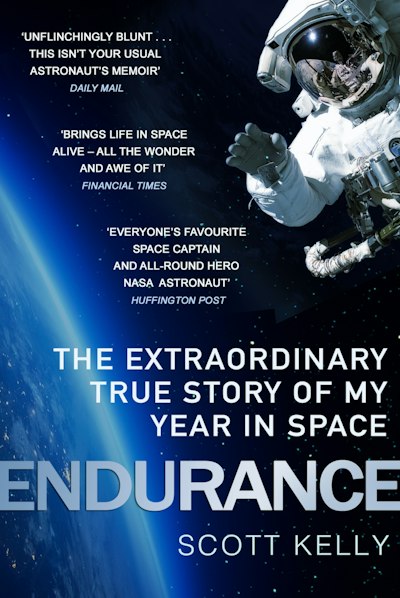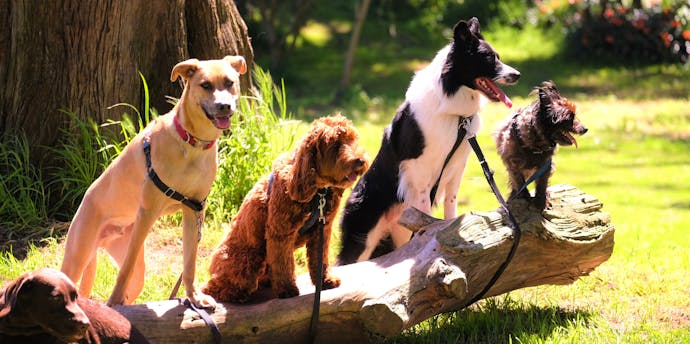Astronaut Scott Kelly reveals some painful downsides of space travel.
Veteran of four space missions, Scott Kelly has experienced things very few of us ever have and very few of us ever will. Endurance is his story of what it’s really like out there – from the existential to the banal – and how viewing the world from afar has affected his perspective of what life’s like back here. After returning from almost a year in space, Kelly relates the magnitude of the minutiae of life we non-space travellers take for granted: family, movement, even everyday sounds. In the passage below he shares some alarming physiological side-effects of returning to Earth, and the crushing gravity the rest of us don’t even notice.
I’m sitting at the head of my dining room table at home in Houston, finishing dinner with my family: my longtime girlfriend, Amiko; my daughters, Samantha and Charlotte; my twin brother, Mark; his wife, Gabby; his daughter, Claudia; our father, Richie; and Amiko’s son, Corbin. It’s a simple thing, sitting at a table and eating a meal with those you love, and many people do it every day without giving it much thought. For me, it’s something I’ve been dreaming of for almost a year. I contemplated what it would be like to eat this meal so many times, now that I’m finally here, it doesn’t seem entirely real. The faces of the people I love that I haven’t seen for so long, the chatter of many people talking together, the clink of silverware, the swish of wine in a glass – these are all unfamiliar. Even the sensation of gravity holding me in my chair feels strange, and every time I put a glass or fork down on the table there’s a part of my mind that is looking for a dot of Velcro or a strip of duct tape to hold it in place. I’ve been back on Earth for forty-eight hours.
I push back from the table and struggle to stand up, feeling like an old man getting out of a recliner.
“Stick a fork in me, I’m done,” I announce. Everyone laughs and encourages me to go and get some rest. I start the journey to my bedroom: about twenty steps from the chair to the bed. On the third step, the floor seems to lurch under me, and I stumble into a planter. Of course it wasn’t the floor – it was my vestibular system trying to readjust to Earth’s gravity. I’m getting used to walking again.
“That’s the first time I’ve seen you stumble,” Mark says. “You’re doing pretty good.” He knows from personal experience what it’s like to come back to gravity after having been in space. As I walk by Samantha, I put my hand on her shoulder and she smiles up at me.
I make it to my bedroom without incident and close the door behind me. Every part of my body hurts. All of my joints and all of my muscles are protesting the crushing pressure of gravity. I’m also nauseated, though I haven’t thrown up. I strip off my clothes and get into bed, relishing the feeling of sheets, the light pressure of the blanket over me, the fluff of the pillow under my head. All of these are things I missed dearly. I can hear the happy murmur of my family behind the door, voices I haven’t heard without the distortion of phones bouncing signals off satellites for a year. I drift off to sleep to the comforting sound of their talking and laughing.
A crack of light wakes me: Is it morning? No, it’s just Amiko coming to bed. I’ve only been asleep for a couple of hours. But I feel delirious. It’s a struggle to come to consciousness enough to move, to tell her how awful I feel. I’m seriously nauseated now, feverish, and my pain has gotten worse. This isn’t like how I felt after my last mission. This is much, much worse.
“Amiko,” I finally manage to say.
She is alarmed by the sound of my voice.
“What is it?” Her hand is on my arm, then on my forehead. Her skin feels chilled, but it’s just that I’m so hot.
“I don’t feel good,” I say.
I’ve been to space four times now, and she has gone through the whole process with me as my main support once before, when I spent 159 days on the space station in 2010–11. I had a reaction to coming back from space that time, but it was nothing like this.
I struggle to get up. Find the edge of the bed. Feet down. Sit up. Stand up. At every stage I feel like I’m fighting through quicksand. When I’m finally vertical, the pain in my legs is awful, and on top of that pain I feel something even more alarming: all the blood in my body is rushing to my legs, like the sensation of the blood rushing to your head when you do a headstand, but in reverse. I can feel the tissue in my legs swelling. I shuffle my way to the bathroom, moving my weight from one foot to the other with deliberate effort. Left. Right. Left. Right.
I make it to the bathroom, flip on the light, and look down at my legs. They are swollen and alien stumps, not legs at all.
“Oh, shit,” I say. “Amiko, come look at this.”
She kneels down and squeezes one ankle, and it squishes like a water balloon. She looks up at me with worried eyes. “I can’t even feel your anklebones,” she says.
“My skin is burning, too,” I tell her. Amiko frantically examines me. I have a strange rash all over my back, the backs of my legs, the back of my head and neck – everywhere I was in contact with the bed. I can feel her cool hands moving over my inflamed skin. “It looks like an allergic rash,” she says. “Like hives.”
I use the bathroom and shuffle back to bed, wondering what I should do. Normally if I woke up feeling like this, I would go to the emergency room, but no one at the hospital will have seen symptoms of having been in space for a year. I crawl back into bed, trying to find a way to lie down without touching my rash. I can hear Amiko rummaging in the medicine cabinet. She comes back with two ibuprofen and a glass of water. As she settles down, I can tell from her every movement, every breath, that she is worried about me. We both knew the risks of the mission I signed on for. After six years together, I can understand her perfectly even in the wordless dark.
As I try to will myself to sleep, I wonder whether my friend Mikhail Kornienko is also suffering from swollen legs and painful rashes – Misha is home in Moscow after spending nearly a year in space with me. I suspect so. This is why we volunteered for this mission, after all: to discover how the human body is affected by long-term spaceflight. Scientists will study the data on Misha and me for the rest of our lives and beyond. Our space agencies won’t be able to push out farther into space, to a destination like Mars, until we can learn more about how to strengthen the weakest links in the chain that makes spaceflight possible: the human body and mind. People often ask me why I volunteered for this mission, knowing the risks – the risk of launch, the risk inherent in spacewalks, the risk of returning to Earth, the risk I would be exposed to every moment I lived in a metal container orbiting the Earth at 17,500 miles per hour. I have a few answers I give to this question, but none of them feels fully satisfying to me. None of them quite answers it.













